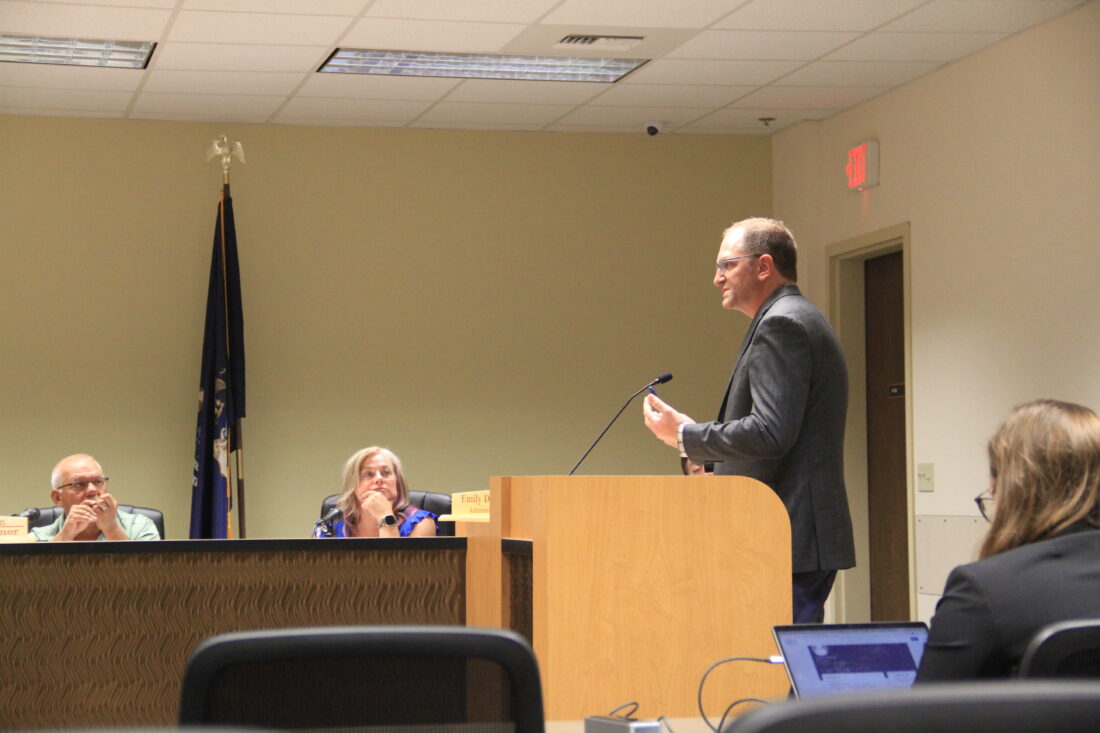Delta County opposes state move on mental health services plans

Pathways CEO Matt Maskart addresses the Delta County Board to explain how the Michigan Department of Health and Human Services' plan to procure bids for inpatient health plans from private entities may hurt the public. (R. R. Branstrom | Daily Press)
ESCANABA — Delta County has joined a number of other counties in the state opposing a plan from the Michigan Department of Health and Human Services to bid out contracts for prepaid inpatient health plans, or PIHP, for the public mental health system.
After hearing a presentation Tuesday from Pathways CEO Matt Maskart about the potential negative outcomes of the new plan, the Delta County Board unanimously voted to sign a resolution expressing their opposition that will be transmitted to Gov. Gretchen Whitmer, MDHHS Director Elizabeth Hertel, legislators and the Michigan Association of Counties.
“For over 60 years, counties in Michigan have helped in guiding and overseeing the public mental health system, the role established when people transitioned out of the state psychiatric hospitals in the ’70s and ’80s,” Maskart said, explaining that county officials now serve on the boards of local Community Mental Health Services Programs, of which Pathways is one.
Since 1997, counties have had a hand in the formation and governance of PIHPs, which manage provider networks and contract with CMHSPs. This local input allows counties to ensure that health plans suit their communities. But recently, the MDHHS announced it would implement a “competitive procurement process” for PIHP contracts that “will help create a more accessible and person-centered system of care,” as Hertel put it.
But the change set off alarm bells for MAC and entities such as Pathways, which fear that quality of care will decline with such a system.
“If management is transferred to private health plans, county governments would lose their direct role in overseeing the allocation and use of Medicaid mental health dollars. This shift could lead to decisions driven by profit motives rather than the best interests of Michigan residents, particularly those with mental illnesses, developmental disabilities and substance use disorders,” the MAC stated in a May letter signed by Executive Director Stephen Currie.
“Mental health providers like Pathways are the frontline providers, and with a designated safety net. The agency is responsible for either directly delivering services or contracting locally to ensure residents get that care as needed,” Maskart said Tuesday.
He added that the request for proposals, or RFPs, sent out by the state “appears designed to favor large private nonprofit health plans and exclude the public PIHPs that have effectively managed Medicaid Michigan’s specialty behavioral services for decades.”
While the current public PIHP system operates with about 2% overhead, private health plans typically operate with close to 15% overhead, which would “exacerbate funding shortfalls” and diminish care, the MAC contends.
In an RFP dated Aug. 5, MDHHS stated that bids were “limited to nonprofit organizations, and additional consideration will be provided to public entities to support public value and encourage collaborative governance” and that one-third of the PIHP’s board members must have “lived experience in Michigan’s specialty behavioral health system.”
But without local oversight, many fear such a process will hurt the public, and that large organizations will swoop in and replace helpful providers with cheap ones, prioritizing cost-savings over community health. Maskart named Blue Cross Blue Shield, Priority Health and McLaren Health Care as examples of large private entities that might win the bids.
Maskart pointed out that jail diversion was one of the community services that Pathways provides, and raised the question of whether certain services would still be funded for the betterment of the community if MDHHS chose another PIHP that didn’t contract with Pathways.
“I don’t want to see our jail become our number one mental treatment facility,” said Commissioner Patrick Johnson.
When Johnson asked what would happen to Pathways if PIHPs went private, Maskart replied that Pathways would become “just another vendor out there.”
It’s possible a private PIHP could seek a cheaper alternative and “who knows which organization will pop up to be able to provide that and be able to start fracturing that service ring,” Maskart said. “… If you start to fracture that and we aren’t able to provide the full service array that we can, then you will have services provided in the jails and in the hospitals, which isn’t good for OSF, it isn’t good for your jail system and isn’t appropriate.”
By unanimously voting to approve the resolution opposing MDHHS’s procurement process, the Delta County Board effectively echoed the position of the MAC, and joined counties around the state — from Iron to Macomb and Osceola — in signing similar resolutions.
“Rather than pursuing this bid-out approach, MDHHS should collaborate with stakeholders — including counties, Community Mental Health Services Programs (CMHSPs), PIHPs and advocacy groups — to implement concrete reforms that address the real challenges facing Michigan’s public mental health system. These reforms should focus on closing the gap in the mental health workforce, increasing funding for services and reducing administrative burdens,” the letter from Currie and the MAC to Whitmer states. “We urge you to instruct MDHHS to halt the PIHP procurement process and work with Michigan counties and other stakeholders to redesign the public PIHP structure. Together, we can develop solutions that strengthen local governance and ensure the continued delivery of high-quality, person-centered care to those who need it most.”
Other board business Tuesday included:
— Administrator Emily DeSalvo presented an initial 2025-26 fiscal year budget that would take effect Oct. 1. She said priorities in 2026 would be to “maintain service level to employees,” expand the IT department and work on infrastructure and maintenance in cooperation with MDOT. Veterans affairs will see an expansion of services and an additional employee. More money has been allocated towards the airport than last year.
A hearing on the budget has been set for the next county board meeting Sept. 2.
— By unanimous motion, authorized the Weitz and Luxembourg law firm to vote in the county’s interests on a new settlement agreement in the opiate prescriptions lawsuit against Purdue Pharma and members of the Sackler family, the former owners of the company, for their alleged role in fueling the opioid crisis.
— DeSalvo reported that, after terminating attorney Scott Graham’s contract in June, no communication had been sent to Graham on the dissolution.
“So I did send a certified letter to his office, reflecting that and asking for any case file information that he obtained to now be given to the county and become our property. I have not heard anything back from his office,” DeSalvo said.
Next steps could include submitting a grievance of non-response to the attorney grievance commission or potentially filing a subpoena to request those case documents, but no decision was made.
— The board passed a resolution declaring they wished to retain all three of the county’s district court judges after the State Court Administrator’s Office proposed the elimination of one position.
– A new animal control ordinance was discussed. One topic of concern was the current process to get pets licensed is not straightforward; another was the handling of dangerous animals. The draft ordinance will be reviewed and a hearing set.
— Commissioner Christine Williams requested commissioners reach out to their respective townships to see if fireworks ordinances were in place or if constituents wanted one.






